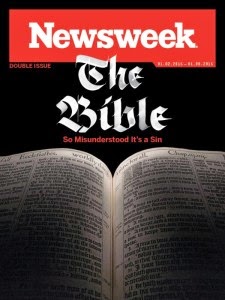Source: Straight from the Heart

A complete and detailed refutation of every error in the piece would require more space than available in a blog like this. Perhaps an examination of just a few of Eichenwald’s errors may serve to reveal the sloppiness of his scholarship and the essential worthlessness of his attempted assault.
First of all is his claim that no one has actually read the real Bible, but “at best we’ve all read a bad translation—a translation of translations of translations of hand-copied copies of copies of copies, and on and on, hundreds of times…About 400 years passed between the writing of the first Christian manuscripts and their compilation into the New Testament.” To read this you would think that Mr. Eichenwald had never heard of textual criticism, or read anything about the creation of the New Testament canon. So, leaving the over-heated rhetoric to Newsweek, let’s recall a few facts.
Consider the manuscripts available from classical antiquity: there are only 9 or 10 good manuscripts of Caesar’sGallic War (written about 55 B.C.), and the oldest of these was written some 900 years after Caesar’s day. The history of Thucydides (ca. 430 B.C.) survives in only 8 manuscripts, the earliest existing manuscript of which dates from about 900 A.D., leaving a gap of about 1300 years from time of writing to earliest manuscript. Yet historians and classical scholars regard Thucydides as a first-rate historian, and no one impugns the reliability of the extant text or writes Newsweekarticles about them.
Contrast this with the New Testament manuscripts: by the middle of the last century, there were almost 4500 known Greek manuscripts. Moreover, two of the most important and complete manuscripts (known to scholars as Vaticanus and Sinaiticus) date from the fourth century, and some of the Chester Beatty manuscripts date from around 225 A.D. One of these latter Chester Beatty texts (now in Dublin) dates from the late third century. One papyrus fragment (containing some verses of John’s Gospel) is now in the John Rylands Library in Manchester, and has been dated to about 125 A.D.—shortly after John’s Gospel was first written. And it is important to remember that most of the variations pored over by scholars concern only fine details, and do not affect the sense of the text. Some of the changes concern, for example, whether or not the text has omitted the word “the”, or changed a present tense to the imperfect tense. Scholars care (after all, that is their job); most people wouldn’t.
The New Testament text that one reads therefore is not like the result of a game of “Telephone” as ourNewsweek’s writer suggests. Rather each modern English translator now returns to what is substantially the original text of the Greek and works from there. One may or may not believe what St. Luke wrote, but we have pretty much the text as Luke originally wrote it. And it is true, of course, that “about 400 years passed between the writing of the first Christian manuscripts and their compilation into the New Testament”. It is also irrelevant. The “compilation into the New Testament” (or the creation of the New Testament canon, the finalization of the list regarding which N.T. books made the canonical “cut” and which didn’t) had nothing to do with the actual date of the texts. We had, for example, a good text of the Epistle to Hebrews by the third century. The debate over whether or not to include it as part of the “New Testament compilation” was another question entirely, and did not concern the reliability of the Hebrews text in their possession.
One other example of Eichenwald’s faulty and sloppy methodology may be examined. Scholars have long since known that the story of the Woman Taken in Adultery in John’s Gospel (John 7.53-8:11) probably represents an insertion into John’s original text. Eichenwald phrases it like this: “John didn’t write it. Scribes made it up sometime in the Middle Ages. It does not appear in any of the three other Gospels or in any of the early Greek versions of John.”
Well, sorry; actually it does. Though the best manuscripts (Vaticanus and Sinaiticus) omit it, a Chester Beatty manuscript from the fifth-sixth century does include it as part of John’s Gospel. Other manuscripts include it after John 7:52, but with asterisks, indicating that the scribe had doubts about it being a part of John’s Gospel. One manuscript includes it in Luke’s Gospel, after Luke 21:38, and one manuscript includes it at the very end of Luke’s Gospel. It seems to have been a genuine historical reminiscence of what happened, but floating free, as part of the early oral tradition (like the saying of Jesus not recorded in any Gospel, but still mentioned by Paul in Acts 20:35). It was early and historically genuine, but not a part of the Gospel narrative texts, and so different scribes inserted it into different places of the Gospels. But by anyone’s figuring it was made “made up” by scribes “sometime in the Middle Ages”, for the Chester Beatty manuscript containing it dates from the fifth-sixth centuries.
One could go on and on and on, but you get the idea. An indication of the confusion of thought and history culminates with Eichenwald’s impassioned denunciation of Constantine, with so much distortion that one checks to see if one isn’t after all reading Dan Brown. It was at the Council of Nicea, the article solemnly suggests, that “to satisfy Constantine and his commitment to his empire’s many sun worshippers, that the Holy Sabbath was moved by one day” (i.e. from Saturday to Sunday). Okay; time to close the magazine. Never mind that the Fathers as early as Justin Martyr (d. 165 A.D.) write that Christians actually met to worship on Sunday, so that Christians had been worshipping on Sunday well before Nicea. Apparently for Mr. Eichenwald any stick is good enough to beat the Christians with, regardless of whether or not it is historical nonsense. We are now far from the world of historical scholarship, and deep in the fantasy world of The Da Vinci Code. When Eichenwald goes on to describe the Council of Constantinople of 381 with the words, “There a new agreement was reached—Jesus wasn’t two, he was now three—Father, Son and Holy Ghost. The Nicene Creed was rewritten”, anyone with an ounce of historical education breaks down and cries.
The Newsweek piece “The Bible: So Misunderstood It’s a Sin” may not reveal much about the Bible, but it does reveal much about Newsweek and our popular culture. The war against the Christians is heating up. Screaming fundamentalists and people like Pat Robertson, Michele Bachmann, and Texas Governor Rick Perry (do they scream too?) may make the easiest targets, but no one should be under any illusion that they are the only or the final ones. Anyone standing on the conservative side of the author is clearly in the ultimate line of fire. Brace yourself, and keep reading real books.






